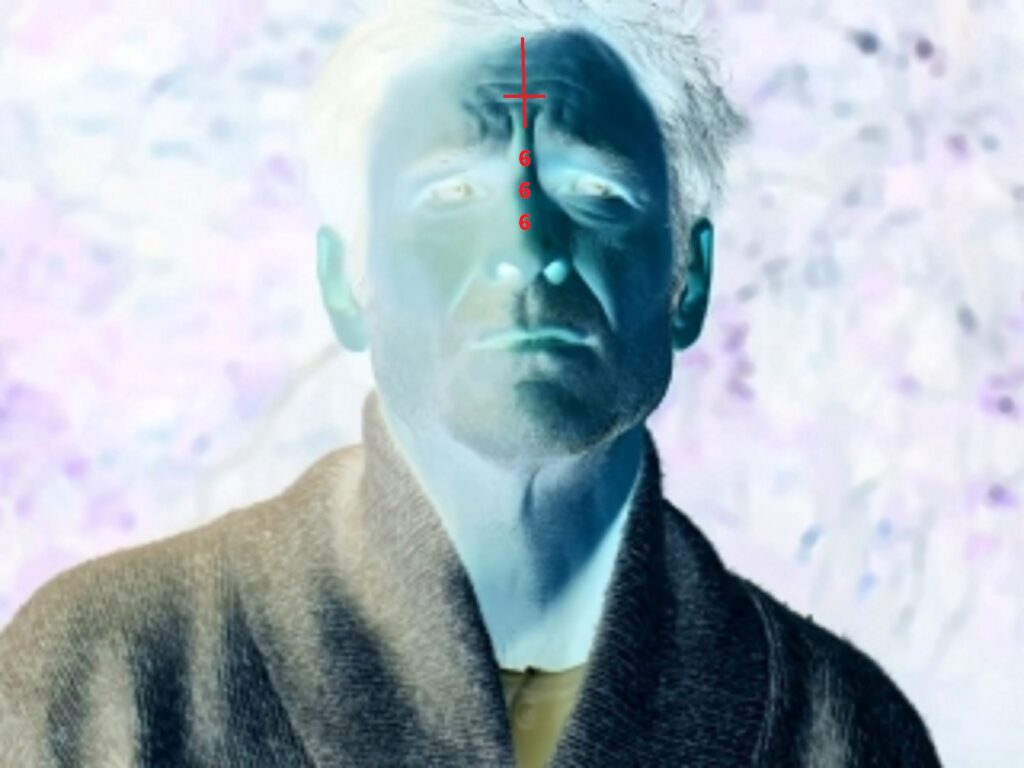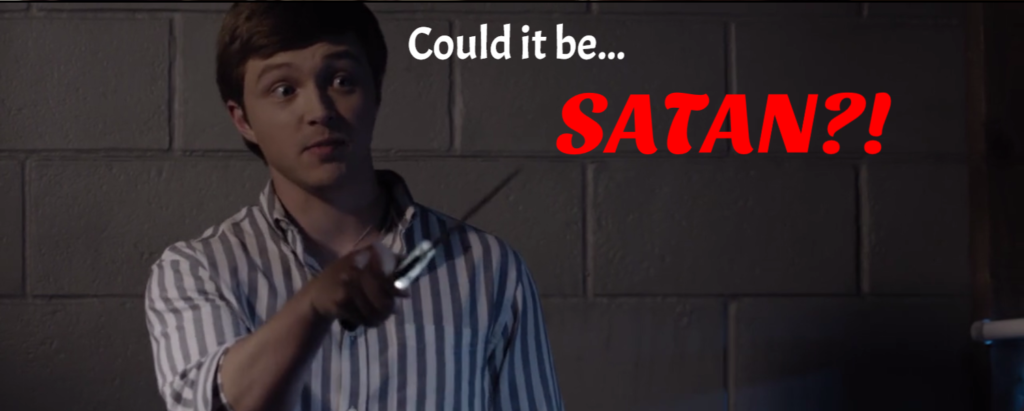
Thus far, 2018 has been the year for excruciatingly gimmicky marketing techniques. First we had The Cloverfield Paradox, a film released just after the Super Bowl that was kept hush-hush until the trailer dropped around ¾ of the way into the game. Moments after the end of the Super Bowl, it was up on Netflix. That movie was utter trash, and it was clear that the marketing was meant to compensate for that.
Fairly recently, The Man From Earth: Holocene appeared on file sharing networks like The Pirate Bay, with little buildup. It was uploaded by the creators themselves, and when you watch a downloaded copy, it comes book-ended with commentary from the film’s director about how movies aren’t cheap to make, and you should support The Man From Earth: Holocene if you enjoy watching the film. With a marketing gimmick like that, this movie is sure to make its budget back an uncountable number of times. I say uncountable because $5 times zero is zero, and $5,000,000 times zero is still zero. I’m sure somebody was paid to be in this shitty movie, but if they were, it certainly wasn’t much. This marketing technique worked for Radiohead, but Radiohead at the very least had to invest in some decent equipment or engineers first. Holocene just needed a camcorder that the director probably had lying around in his basement. Oh yeah, Radiohead had talent, too.
Holocene is the sequel to 2007’s The Man From Earth, a fine enough film that a few people saw and promptly forgot. It was obviously low budget, but its premise was intriguing enough that you could forget how awful the acting was. It was a film that took its own budget constraints and wrote around them, something I admire.
Below this line, there will be spoilers for the first and second films, but please don’t let that dissuade you from reading this review, because the plot of the second film only serves to highlight how awful the first film really was. Believe me when I say you probably want these films spoiled for you.
———————————————————————————
There’s only one thing you need to know about The Man From Earth, and it’s hinted at in the IMDB plot synopsis. Our main character, nauseatingly named John Oldman, is Jesus, Buddha, and all religious figures wrapped up in one package. He’s a 14,000-year-old caveman who happens to be immortal. Every time he starts spewing out wisdom, people assume he’s divine, so that’s apparently where every religious figure throughout history came from. John travels around the world as a teacher, and the first film has him explaining his existence to his fellow faculty members the night before his big departure from the school he was currently working at.
The first film does an interesting job at showing us the loneliness of its premise, and how awful it must be to be regarded as a messianic figure wherever one goes. As I write down that sentence, it sounds rather pompous, and after seeing Holocene, I take back any kind words I had to say about the first film, which is nothing more than a bunch of grumpy teachers sitting around debating whether or not John could possibly exist.
So, going into this, I expected a talky one-act about modern Jesus, since you can transplant a character like John into just about any situation.
Oof.
Holocene has many similarities to its predecessor, but the production values are noticeably lower, the acting is shittier, the rhetoric is bizarre, the characters are all stereotypes, and most interestingly, the film is remarkably anti-Christian.
I have given many low budget Christian films lots of shit, and they have all deserved it. Most of them justify their existence by the potential for converting people to the Abrahamic faiths (or, a very particular denomination in the guise of “general Abrahamic faiths”), or the fact that Hollywood has just become way too dirty, and there goes the neighborhood. Let’s give our children, who likely won’t grasp or care about the religious message of a film, some good wholesome entertainment. This often leads to poorly thought-out plots that make Atheists and Agnostics look like serial killers and rapists, and most of them “realize they are wrong” right before they die. When the Christian film industry isn’t Pascal’s Wagering their way into mean-spirited commentary, they’re badly recreating the Bible by releasing shitty reproductions of old Cecil B. Demille films. To make matters worse, “oppressed Christians” apparently make up a giant chunk of the movie-going population, and they will show up in droves to support their awful films about how persecuted they are, and how they’re in the minority everywhere they go. These films are extremely cheap to make, so why not churn them out at an alarming rate? Hardcore Evangelicals will buy anything if you put a little Jesus in it, so let’s assembly-line that shit in the most cynical way possible.
And on the eighth day, God said, “Let there be Pureflix,” and there was Pureflix.
Congratulations, evangelicals. The Man From Earth: Holocene is here to legitimize your persecution claims.
For as cynical and exploitative as the Christian film industry is, The Man From Earth: Holocene is several times more cynical and exploitative, and that’s an accomplishment. Its premise, that a single immortal man is mistaken for a messiah throughout history, did not feel anti-Christian in the first film, but it certainly does in Holocene.

The story begins with a bunch of ne’er-do-well millennials who just won’t put down their phones while taking a tour of a history museum. Their teacher is naturally forced to get pissy with her students, because we hate millenials who won’t pay attention to the faux-wisdom of their elders. This will certainly be a plot point later, because throwing shade at this generation is trendy. We learn that John Oldman has moved on to another school, and is exceptionally beloved by his students.
We are gradually introduced to each of our main characters, which happen to be four mean-spirited stereotypes. Liko is “the black guy.” He is chronically late, good at basketball, and does whatever his white friends tell him to. Isabel is Asian, and also our group’s fearless leader. She can recite historical facts precisely when the screenplay needs her to. Tara is Isabel’s white friend. She spends most of the film talking about how hot John Oldman is, because she has daddy issues. By far the most absurd of these characters, and also my personal favorite, is Philip. He is a devout Christian, and he’s extremely insecure in his faith. He loves to kill people with kindness, to display how pious he is.
These four students learn of John’s identity over the course of the film, by breaking into his girlfriend’s house, contacting his worst enemy (a guy from the first film that wasn’t notable then and isn’t now), and eventually confronting him, each in their own way.
So, the first film’s concept is a play on the “what if God was one of us” concept. What would Jesus think of us if he were alive today? That was only a small part of the plot, the backdrop if you will, and the rest was focused on John’s half-hearted attempts to convince his pompous colleagues that he really is Jesus. The film strongly implies that he is the inspiration for multiple religious figures, but because Jesus is the one most Americans will be familiar with, it mostly leaves its focus there.
Holocene takes this concept, and uses its four characters to forcefully tell us how each stereotype would react to a Jesus-among-us scenario.
Let’s start with Liko. He’s black. He represents black people. He’s cool with John.

Isabel, our Asian history buff, wants to use John to spread his “gospel.” What that gospel is isn’t exactly clear, to her or to John. Basically, she wants the world to know that Jesus is here, because the pursuit of knowledge is important to her. She must share her findings with the world, or risk dishonoring her family.

Tara represents all those people who would want to fuck Jesus, I guess. She has some pretty extreme daddy issues. After a sob story about how it’s super difficult to be that hot, and how her parents’ friends stare at her all the time, she tries to rape John in his office.

Philip is the most heavy-handed stereotype in the film. Throughout, the characters all apologize to Philip for entertaining the idea that John Oldman is who they suspect he is, because if it’s true, Philip’s religious convictions are just a lie. He retorts with statements about how strong his faith is, and throughout the film, he becomes less and less sure of his answers. He is a shockingly obvious character who represents how modern Christians would react if they met Jesus. Or rather, how the FILM believes they would react.

Once the kiddies are mostly convinced that there may be some truth to the rumors about John, they decide to confront him. They try to get a clear picture of him so that “mean guy from previous film” can identify him, but John keeps obscuring his face whenever they try to snap a photo. After finally obtaining a clear picture of John by sneaking into his house while he is asleep, they discover that John is about to leave. In an attempt to get more answers out of him, they do everything in their power to keep him where he is. Liko tazes John as he tries to walk away, and the group ties him to a chair in a basement. They’re waiting for random hateful guy from the first movie to arrive to confirm John’s identity, but his car has broken down. The group agrees to pick him up, and they leave Philip in charge of guarding John until they get back.
Bad move, kids. Never leave a Christian alone with Jesus. When John regains consciousness, Philip gives him the third degree. When Philip begins to believe that John is who he says he is, he feels that his faith is crumbling around him. He begins to draw the conclusion that John is lying, and that he may be the Anti-Christ. John goads Philip into stabbing him in the side, because that’s an appropriately Jesus-y place to be stabbed. Philip does, and when the rest of the group arrives at the basement, John and Philip are nowhere to be found.

If you’ve been paying attention to the allegory so far, it’s blatantly obvious that the filmmakers want you to know that if Jesus was here on earth right now, Christians would crucify him all over again. I feel like there’s a far more tactful way to get this message across without having Philip turn into a raging psychopath at the end of the film, but there we have it.
But lo!
John has arisen again, and we find him hiding out in the middle of nowhere. One of the more kind characters from the first film shows up to rescue him, and we learn that John’s wounds aren’t healing rapidly like they normally would. He’s becoming mortal. The explanation we get for this is that these days, there are security cameras everywhere, and he just can’t hide anymore. Also, the era known as the “Holocene” is apparently coming to an end, and there is no more room for a Jesus-like figure. The message of the first film, that the religious figures of the world were just this one wise guy who was misunderstood, is totally subverted in this ending, because suddenly we’re focusing on the supernatural aspect of John’s character. John agrees to meet his friend’s father, who is dying, and they drive away.
Sorry Jesus, no room in the inn. Millenials have bought up all the property in the area, and if you need a place to stay, you’ll have to get a smartphone and download the Air B&B app.
Because Marvel has had a pervasively negative influence on the entire film industry, we get a post-credits sequence. Two of them actually. In the first, a shadowy FBI agent appears on the front door of “disgruntled man from first film.” They both express an interest in finding John, and for a scenario in which an FBI agent shows up at someone’s front door, it’s a rather cordial exchange in spite of the fact that the guy is trying his best to do a mysterious FBI agent voice.
The most terrifying part of the film comes in the form of the final post- (or mid-) credits sequence. The director once again lectures us about how making movies isn’t free, and you should totally give him money for making a shitty movie, because it’s still a movie. Also, he points out that the ending of the film is deliberately vague, because he wants to make more sequels, or possibly a TV show, which would apparently be about John running from the FBI. God help us all if this ever happens.
Holocene is the worst kind of sequel. Its mean-spirited approach to its premise retroactively destroys what the first film was going for. While the former felt like a decent try at a first screenplay or stage production, the latter is a try-hard Z-grade exploitation film that hates its characters. Even the marketing gimmick is lame, and it really only serves to bring unnecessary attention this gigantic mess of a film.
+1 point for how entertainingly awful the Christian stereotype is, and for providing a concrete example of how secular films can handle religion in a similarly irresponsible fashion as God’s Not Dead or I’m Not Ashamed.
2/10